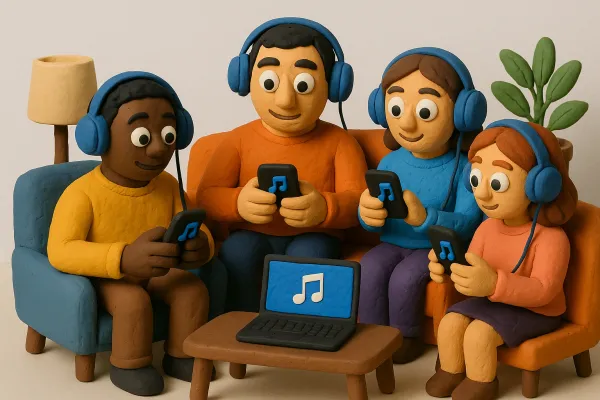Understanding What Are Music Publishing Rights: A Comprehensive Guide for Creators

Music publishing rights can seem like a confusing topic, but they’re an essential piece of the puzzle for songwriters, artists, and anyone creating music. These rights help ensure that creators get paid when their work is used, whether it’s streamed, performed live, or featured in a movie. If you’re serious about your music, understanding these rights isn’t just helpful—it’s a must. In this guide, we’ll break it all down so you can take control of your music and make the most of your creations.
Key Takeaways
- Music publishing rights protect songwriters and composers, ensuring they get paid for their work.
- These rights cover areas like mechanical royalties, performance royalties, and sync licenses.
- Understanding the difference between composition rights and sound recording rights is important.
- Music publishers play a big role in managing and collecting royalties on behalf of creators.
- Making informed decisions about deals and copyright registration can maximize your income.
What Are Music Publishing Rights and Why They Matter
Defining Music Publishing Rights
Music publishing rights are essentially the legal backbone of the music industry. They give creators control over how their songs are used, whether it's in a movie, a commercial, or even a live performance. These rights cover the composition of a song—the melody, lyrics, and structure—not the actual recording. Think of it as owning the blueprint of a house rather than the house itself. Without these rights, songwriters and composers wouldn’t earn a dime from their work being used.
The Importance of Protecting Your Work
Imagine pouring your heart into writing a song, only to see it used in a big-budget ad without your permission—or worse, without you getting paid. Protecting your publishing rights ensures you’re fairly compensated every time your work is played, performed, or licensed. Here’s why it matters:
- Financial Security: Royalties from publishing rights provide a steady income stream.
- Creative Control: You decide how and where your music gets used.
- Recognition: Proper licensing ensures you get credited for your work.
How Publishing Rights Impact Creators
For creators, publishing rights aren’t just about money—they’re about career longevity. These rights open doors to revenue streams like royalties, licensing deals, and even international exposure. Plus, they give you a seat at the table when negotiating with publishers or platforms that want to use your music.
Music publishing rights don’t just protect your work—they protect your future as a creator.
Breaking Down the Types of Music Publishing Rights
Composition vs. Sound Recording Rights
When we talk about music rights, there are two main categories to keep in mind: composition rights and sound recording rights. Composition rights cover the song itself—the melody, lyrics, and arrangement. These are usually owned by the songwriter or composer. Sound recording rights, on the other hand, are tied to the actual recorded version of the song and are often owned by the performer or a record label. Think of it like this: the composition is the blueprint, while the sound recording is the finished building. Both are important, but they serve different purposes in the music world.
Understanding Mechanical and Performance Royalties
Royalties are the bread and butter of music publishing, and they come in two main flavors: mechanical and performance. Mechanical royalties are generated every time your song is reproduced—whether that’s on a vinyl record, a CD, or even a digital download. Performance royalties, meanwhile, are earned whenever your music is played in public spaces like on the radio, at a concert, or even in a coffee shop. These royalties ensure that creators get paid for the different ways their music is consumed.
What Are Synchronization Rights?
Synchronization rights, or "sync rights," are all about pairing music with visuals. If your song is used in a movie, TV show, commercial, or even a YouTube video, you’re dealing with sync rights. This can be a lucrative avenue for artists, as it often involves one-time licensing fees and can also boost your song's popularity by reaching new audiences. It’s not just about the money—it’s also about exposure.
How Music Publishing Rights Generate Income
The Role of Royalties in Music Publishing
Royalties are the bread and butter of music publishing. Every time a song is streamed, played on the radio, or performed live, royalties are generated. These payments ensure that creators get their fair share for their hard work. There are different types of royalties, each tied to specific uses of a song. For example, mechanical royalties come from the sale of physical or digital copies, while performance royalties are earned when a song is played publicly, like at a concert or on the radio.
Here’s a quick breakdown:
| Type of Royalty | How It’s Earned |
|---|---|
| Mechanical Royalties | From physical sales, digital downloads, and streams. |
| Performance Royalties | When a song is played live or broadcasted publicly. |
| Synchronization Fees | Licensing music for movies, TV, or ads. |
Licensing Your Music for Media and Commercials
Ever hear a song in a TV show or commercial and wonder how it got there? That’s synchronization licensing at work. When your music is used in media like film, advertisements, or even video games, you get paid a sync fee. These deals can be incredibly lucrative, especially if your song ends up in a popular movie or ad campaign. The best part? The exposure can also boost your streaming and sales numbers. It’s a win-win.
Exploring Co-Publishing and Administration Deals
Sometimes, songwriters team up with music publishers through co-publishing or administration deals. In a co-publishing deal, you share ownership of the rights with the publisher, but you also share the profits. Administration deals, on the other hand, let you keep full ownership while the publisher handles the nitty-gritty stuff like licensing and royalty collection. Both options have their perks, and the right choice depends on your goals as a creator.
Publishing rights might seem complicated at first, but once you understand how they work, they can open up a steady stream of income for years to come.
Navigating Music Copyright and Ownership
The Basics of Music Copyright
Alright, so let’s break it down. Music copyright is like a protective shield for your songs. It’s what gives you, the creator, legal rights over your music. What’s cool is that every song actually has two copyrights:
- The Composition: This covers the melody, lyrics, and overall structure of your song. Think of it as the blueprint. Usually, songwriters and composers own this part.
- The Sound Recording: This is all about the actual recorded version of the song. It’s often owned by record labels, but if you’re an indie artist, it’s all yours.
Without these copyrights, anyone could just take your work and use it however they want. And let’s be real, nobody wants that.
Who Owns What: Songwriters vs. Performers
Here’s where things can get messy. Ownership depends on who did what. If you’re the songwriter, you own the composition rights. But if someone else performs or records it, they might own the recording rights.
- Songwriters: You’ve got the rights to the composition. This means you can license it out for movies, ads, or even other artists to perform.
- Performers: If you’re the one recording the song, you may own the sound recording rights—unless, of course, you’re signed to a label, in which case they probably own it.
Pro tip: Always have clear agreements in place before collaborating. It saves a ton of headaches later.
How to Register and Protect Your Copyrights
Okay, so you’ve written a killer song. Now what? You need to protect it. Here’s how:
- Document Everything: Keep drafts, recordings, and anything that proves you created the song.
- Register with a Copyright Office: In the U.S., for example, you can register your work with the Copyright Office. This gives you extra legal protection if someone tries to steal your song.
- Work with a PRO: Performance Rights Organizations (like ASCAP or BMI) help you collect royalties when your music gets played publicly.
Taking these steps might feel like a hassle, but trust us, it’s worth it. Your music is your baby—protect it like one.
For more on clearing up confusion around music copyright, check out this beginner's guide. It’s a lifesaver for understanding the nitty-gritty without all the legal jargon.
The Role of Music Publishers in Managing Rights
What Do Music Publishers Actually Do?
Music publishers wear a lot of hats, but their main gig is making sure songwriters get paid fairly for their work. They handle the nuts and bolts of registering songs with Performing Rights Organizations (PROs), negotiating licensing deals, and even tracking down royalties. Think of them as the business brains behind the creative magic. While songwriters focus on creating, publishers ensure those creations earn money and stay protected.
Here are some of the key tasks they take on:
- Registering compositions to secure copyright protection.
- Licensing music for use in TV, films, ads, and more.
- Collecting royalties from performances, streams, and sales.
- Negotiating deals with record labels and other entities.
How Publishers Help Collect Royalties
Royalties can come from all over—streaming platforms, radio, live concerts, and even karaoke bars. Tracking and collecting these payments is a messy, time-consuming process. That’s where publishers step in. They monitor all the places your music gets played and make sure every penny owed to you actually lands in your pocket.
There are different types of royalties they keep tabs on:
| Type of Royalty | Example Source |
|---|---|
| Performance Royalties | Radio play, live shows |
| Mechanical Royalties | CD sales, streaming |
| Sync Royalties | Film or ad placements |
Without publishers, a lot of this income could slip through the cracks.
"Let’s be honest—chasing down royalties isn’t fun. Publishers take care of this headache so creators can focus on what they love: making music."
Negotiating Deals with Music Publishers
When it comes to signing a deal with a music publisher, it’s all about finding the right fit. Publishers often offer different types of agreements, like full publishing deals, co-publishing deals, or administration-only deals. Each has its pros and cons, so it’s important to know what you’re signing up for.
Key things to look for in a publishing deal:
- Royalty Splits: How much of your earnings will the publisher take?
- Scope of Rights: What specific rights are you handing over?
- Duration: How long will the agreement last?
A good publisher will work hard to bring your music to new audiences while ensuring you’re fairly compensated. After all, their success is tied to yours. Music publishers manage and protect the copyrights of your work, so finding a trustworthy partner is critical.
Strategies for Maximizing Your Music Publishing Rights
Tips for Negotiating Better Deals
When it comes to music publishing, negotiating the right deal can make or break your career. Don’t settle for the first offer that comes your way. Here are some tips to get the most out of your agreements:
- Know your worth: Understand the value of your music and the potential revenue it can bring in.
- Research deal types: Be familiar with full publishing, co-publishing, and administration deals to choose what fits best.
- Hire a pro: A lawyer or experienced manager can help spot red flags and push for better terms.
Remember, the goal is to maintain control over your work while securing fair compensation.
Leveraging Your Rights for Media Placements
Getting your music featured in movies, TV shows, or commercials can be a game-changer. To make this happen:
- Build relationships: Network with music supervisors and publishers who specialize in sync licensing.
- Create a catalog: Have a variety of tracks ready to pitch, including instrumental versions.
- Stay accessible: Make sure your contact info is easy to find for anyone interested in licensing your music.
Media placements not only boost your income but also introduce your music to a wider audience.
Building a Long-Term Revenue Strategy
Short-term wins are great, but thinking long-term is where the real money is. Here’s how to set yourself up:
- Register your work: Use a Performance Rights Organization (PRO) to ensure your rights are protected.
- Diversify income streams: Explore royalties, sync deals, and even merchandise tied to your music.
- Reinvest wisely: Put some of your earnings back into your career—whether it’s better equipment, marketing, or collaborations.
A solid plan today can ensure steady income for years to come.
Common Challenges in Music Publishing and How to Overcome Them
Understanding Complex Licensing Agreements
Let’s face it—licensing agreements can feel like they’re written in another language. Between the legal jargon and the endless clauses, it’s easy to feel overwhelmed. The key is to break it down into smaller, manageable pieces. Start by understanding the basics: what rights you’re giving away and what you’re keeping. If you’re unsure, bring in a music lawyer or a trusted advisor to help you decode the fine print.
Here’s what you should focus on:
- Usage rights: What can the licensee do with your music?
- Duration: How long does the agreement last?
- Exclusivity: Is your music tied to just one project or client?
A little help upfront can save you from headaches down the road.
Avoiding Common Pitfalls in Publishing Deals
We’ve all heard horror stories about artists signing bad deals. Whether it’s giving away too much control or earning pennies on royalties, the risks are real. To avoid these traps:
- Read everything carefully. Don’t rush into signing anything, no matter how exciting the opportunity seems.
- Negotiate where you can. Royalties, rights, and even timelines are often flexible.
- Understand your worth. Know what your music brings to the table and don’t settle for less.
Publishing agreements are partnerships, not handouts. Make sure you’re getting a fair shake.
Staying Informed About Industry Changes
The music industry moves fast. New streaming platforms pop up, laws around royalties shift, and trends in licensing evolve. If we’re not paying attention, we could miss out on opportunities—or worse, fall behind.
Here’s how to stay ahead:
- Follow industry news. Keep tabs on what’s happening in music publishing and copyright law.
- Join communities or forums. Other creators often share insights and updates.
- Work with professionals. A good music publisher or manager will help you stay in the loop.
Staying informed isn’t just about protecting what you have—it’s about spotting new ways to grow.
By tackling these challenges head-on, we can navigate the twists and turns of music publishing with a little more confidence and a lot less stress.
Music publishing can be tricky. Many people face issues like getting paid on time or protecting their work. But don’t worry! There are ways to tackle these problems. If you want to learn more about how to handle these challenges, visit our website for helpful tips and resources. Let’s make your music journey smoother!
Wrapping It Up
Alright, so that's the lowdown on music publishing rights. It might seem like a lot to take in, but understanding how these rights work can really make a difference for your music career. Whether you're a songwriter, composer, or just someone curious about the industry, knowing your rights helps you get paid for your hard work and creativity. So, take the time to learn, ask questions, and maybe even get some advice from the pros. At the end of the day, it's all about making sure your music gets the respect—and the paycheck—it deserves.
Frequently Asked Questions
What are music publishing rights?
Music publishing rights are legal protections for songwriters and composers, ensuring they earn money whenever their music is used, performed, or shared.
Why are music publishing rights important?
These rights make sure creators are paid fairly for their work, helping them build a sustainable career while protecting their intellectual property.
What is the difference between composition and sound recording rights?
Composition rights cover the melody and lyrics of a song, while sound recording rights protect the specific recorded version of that song.
How do music publishing rights generate income?
Music publishing rights earn money through royalties, licensing agreements, and deals for media use like movies or commercials.
What role do music publishers play?
Music publishers manage rights, collect royalties, negotiate deals, and help promote songs to maximize earnings for the creators.
How can I protect my music copyrights?
You can protect your music by registering your copyrights with the appropriate organizations and ensuring any agreements you sign are clear and fair.





